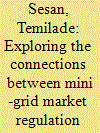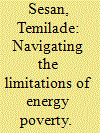| Srl | Item |
| 1 |
ID:
192727


|
|
|
|
|
| Summary/Abstract |
About 140 million people across Africa are expected to gain access to electricity from mini grids by 2040. Nigeria, with the least dependable electricity supply on the continent, stands to benefit significantly from this boon. Accordingly, the government has put in place clear regulations to incentivise private investment and drive market growth. While the techno-economic dimensions of the growing mini-grid sector and the broader electricity industry have been extensively studied, less attention has been paid to analysing the impacts of the regulatory framework on the achievement of rural electrification and universal energy access goals. Drawing on qualitative data obtained from key regulatory and market actors in the Nigerian mini-grid sector, this paper interrogates the premise of pursuing widespread rural electrification through a regulatory framework that is primarily geared toward increasing market efficiency. The study finds that, while the current framework has enabled growth in the sector, complementary mechanisms are required to achieve equitable distribution of access, especially among the mainly rural populations dwelling on the fringes of mainstream electricity markets. The findings are instructive for practitioners and policy makers seeking evidence-informed approaches to achieving the goal of universal energy access in Africa.
|
|
|
|
|
|
|
|
|
|
|
|
|
|
|
|
| 2 |
ID:
114305


|
|
|
|
|
| Publication |
2012.
|
| Summary/Abstract |
Energy poverty has been defined as the lack of access of households in developing countries to modern energy sources, and their consequent reliance on solid biomass fuels for cooking. Improved stoves have been promoted by development actors since the 1970s to alleviate various environmental and health problems associated with biomass use, with largely disappointing outcomes. Against this background, this paper examines the intervention of an international development organisation - Practical Action - in West Kochieng, Kenya, where the organisation's energy poverty alleviation efforts are aimed at addressing the health hazards of biomass smoke with six 'low-cost' improved cooking technologies. The study reveals that the cooking technology most valued by poor West Kochieng households is the one which most reflects their priorities, rather than those expressed by Practical Action. The findings point to three aspects of appropriateness of energy poverty alleviation interventions - technological, economic and cultural - which combine to influence acceptance and uptake of such interventions. The evidence highlights some of the limitations inherent in the generic policy recommendation to 'leapfrog' towards the resolution of energy poverty-related problems, and suggests that more measured steps which respond to the socio-economic realities of poor households are likely to engender more appropriate solutions.
|
|
|
|
|
|
|
|
|
|
|
|
|
|
|
|